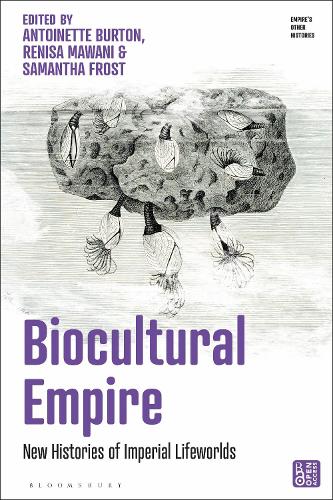
Biocultural Empire: New Histories of Imperial Lifeworlds
(Hardback)
Publishing Details
Biocultural Empire: New Histories of Imperial Lifeworlds
By (Author) Professor Antoinette Burton
Edited by Renisa Mawani
Edited by Samantha Frost
Bloomsbury Publishing PLC
Bloomsbury Academic
9th January 2025
United Kingdom
Classifications
Professional and Scholarly
Non Fiction
Indigenous peoples / Indigeneity
The environment
909.0971241
Physical Properties
Hardback
240
Width 155mm, Height 231mm, Spine 18mm
520g
Description
Human species supremacy is one of the most persistent fictions at work in the field of modern British imperial history today. This open access collection challenges that assumption, and investigates what histories of empire look like if reimagined as the effect of biocultural, chemical and cultural processes, rather than the result of effects by humans that have been visited upon cultural landscapes, fauna and biomes. In understanding the boundaries between human and nonhuman worlds as porous and open to mutual transformation, and foregrounding interspecies interactions, Biocultural Empire seeks to understand the conditions of imperial power, experience and knowledge as a remix of nature and culture. Bringing empires biocultural histories to the fore, it asks imperial historians to reckon with an interpretative framework which refuses the sovereignty and boundedness of the imperial subject by seeing it as inseparable from its social and ecological formations. Through this biocultural framework this collection highlights how relentlessly the human species bias of western liberal thought persists at the heart of imperial projects and their histories, and offers a new anti-colonial method that represents a significant intervention in the field of British imperial history. The ebook editions of this book are available open access under a CC BY-NC-ND 4.0 licence on bloomsburycollections.com. Open access was funded by University of Illinois, USA and University of British Columbia, Canada.
Author Bio
Antoinette Burton is Professor of History and Maybelle Leland Swanlund chair at University of Illinois Urbana-Champaign, USA. A feminist historian of the British Empire whose work has focused on women, gender, race and intersectional approaches, she is the author of six monographs and many edited collections including (with Renisa Mawani) Animalia: An Anti-Imperial Bestiary for Our Times (2020). Samantha Frost is Professor of political theory in the Department of Political Science, the Department of Gender and Womens Studies, and the Unit for Criticism and Contemporary Theory at the University of Illinois, Urbana-Champaign, USA. She is the author of Biocultural Creatures: Toward A New Theory of the Human (2016), which elucidates the conceptual significance of the plasticity of the biological body. Renisa Mawani is Canada Research Chair in Colonial Legal Histories and Professor of Sociology at the University of British Columbia, Canada, located on the unceded territories of the Musqueam peoples. She is the author of Colonial Proximities (2009) and Across Oceans of Law (2018), which was a finalist for the U.K. Socio-Legal Studies Association Theory and History Book Prize (2020) and winner of the Association of Asian American Studies Book Prize for Outstanding Contribution to History (2020). With Antoinette Burton, she is co-editor of Animalia: An Anti-Imperial Bestiary for Our Times (2020).
